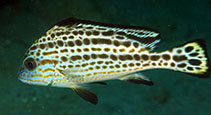| Family: |
Haemulidae (Grunts), subfamily: Plectorhinchinae |
| Max. size: |
100 cm FL (male/unsexed); max.weight: 6,300.0 g |
| Environment: |
reef-associated; marine; depth range 1 - 170 m, non-migratory |
| Distribution: |
Indo-West Pacific: Arabian and Mozambique channel eastward to Gulf to Palau north to Japan south to New Caledonia. |
| Diagnosis: |
Dorsal spines (total): 9-10; Dorsal soft rays (total): 21-25; Anal spines: 3-3; Anal soft rays: 7-7. Description: Small juveniles dorsal spinous fin black, with stripes, broad black on median of body to tail, and yellow or white from eye to upper caudal fin. Large juveniles yellow or white with broad black horizontal stripes on body, dorsal fins and tail. Subadult greyish silver with brownish orange spots on head, body, and median fins. Adults become plain grey or spotted. (Ref. 48635, 90102) The Queensland fish are plain grey (Ref. 48635). Body depth 2.7-3.0 in SL. Dorsal fins 2nd spine longest. Juveniles caudal fin slightly rounded to truncate with growth. (Ref. 90102) |
| Biology: |
Typically found solitary or in groups, often in turbid water. on open muddy, sandy or silty substrates in protected bays or estuaries, around rock outcrops, wreckage and debris (Ref. 48635, 90102). Also in shallow coastal areas and coral reefs (Ref. 30573). Juveniles are found in weedy areas (Ref. 2799). Feeds on benthic invertebrates and fishes (Ref. 30573). Reportedly ciguatoxic in some areas (Ref. 2799). Marketed fresh and frozen (Ref. 9987). |
| IUCN Red List Status: |
Not Evaluated (N.E.) Ref. (130435)
|
| Threat to humans: |
reports of ciguatera poisoning |
Source and more info: www.fishbase.org. For personal, classroom, and other internal use only. Not for publication.
